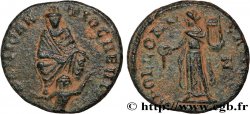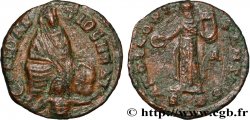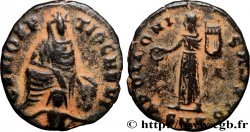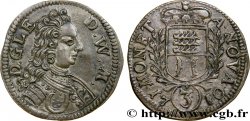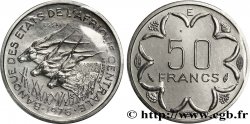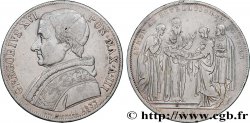v43_0976 - ANTIOCHIA Demi-follis ou demi-nummus
MONNAIES 43 (2010)
Starting price : 180.00 €
Estimate : 280.00 €
unsold lot
Starting price : 180.00 €
Estimate : 280.00 €
unsold lot
Type : Demi-follis ou demi-nummus
Date: 310-311
Mint name / Town : Antioche
Metal : copper
Diameter : 15 mm
Orientation dies : 11 h.
Weight : 1,27 g.
Rarity : R1
Officine: 10e
Emission: 2e
Coments on the condition:
Exemplaire de qualité exceptionnelle pour ce monnayage souvent mal frappé. Droit magnifique, finement détaillé. Apollon de style fin au revers. Servi par une extraordinaire patine vert et sable
Catalogue references :
Obverse
Obverse legend : GENIO AN-TIOCHENI.
Obverse description : La Tyche d’Antioche vue de face, tourelée, drapée assise sur un rocher ; à ses pieds, L’Oronte, nageant à droite, tournant la tête à gauche.
Obverse translation : “Genio Antiocheni”, (Au Génie d’Antioche).
Reverse
Reverse legend : APOLLONI - SANCTO/ -|I// SMA.
Reverse description : Apollon debout de face, tourné à gauche, vêtu du chiton et du peplos, tenant une patère de la main droite et une lyre de la main gauche.
Reverse translation : “Apollini Sancto”, (À l’Apollon saint).
Commentary
Pour cette émission J. Van Heesch a répertorié 96 exemplaires pour les dix officines dont treize pour la dixième officine. J. Van Heesch, Une frappe semi-autonome sous Maximin Daza, RBN, Bruxelles 1975, p. 105-106, n° 3c pl. XI.








 Report a mistake
Report a mistake Print the page
Print the page Share my selection
Share my selection Ask a question
Ask a question Consign / sell
Consign / sell
 Full data
Full data
